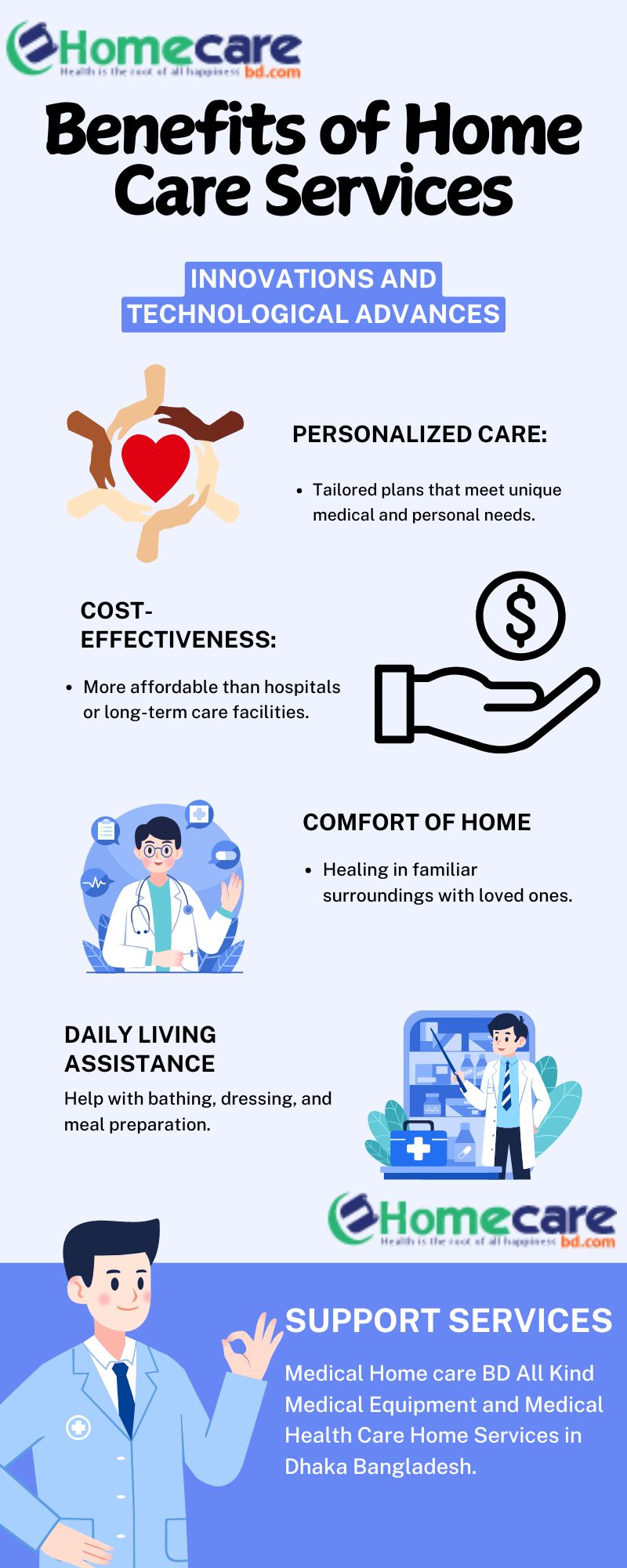
In today’s fast-paced world, home care services have become an essential component of healthcare systems globally. These services are designed to provide medical, personal, and emotional support to individuals in the comfort of their own homes. Whether for the elderly, those recovering from surgery, or individuals managing chronic illnesses, home care offers numerous benefits that enhance the quality of life for patients and their families. This comprehensive guide explores the many advantages of home care services, highlighting their impact on health, well-being, and overall life satisfaction.
1. Personalized and Individualized Care
One of the primary advantages of home care services is the ability to tailor care to the specific needs of the individual. Unlike institutional care settings, where patients receive standardized care, home care allows for a customized approach. Caregivers work closely with patients and their families to develop care plans that address unique medical conditions, preferences, and daily routines.
For example, a patient recovering from knee surgery may require assistance with physical therapy exercises and mobility. A professional caregiver can provide one-on-one support, ensuring that the patient’s rehabilitation process aligns with their recovery goals. Similarly, for individuals with chronic illnesses like diabetes or hypertension, home care professionals can offer personalized monitoring and management, reducing the risk of complications.
2. Comfort and Familiarity of Home
The psychological and emotional benefits of staying in a familiar environment cannot be overstated. Home care enables patients to receive treatment and support without the need to relocate to a hospital or nursing facility. Being surrounded by personal belongings, family members, and cherished memories fosters a sense of security and comfort.
Studies have shown that patients recovering at home often experience faster recovery times compared to those in institutional settings. The familiar environment reduces stress and anxiety, which are common barriers to healing. Additionally, patients retain a greater sense of independence, as they can maintain their daily routines and continue living life on their terms.
3. Enhanced Health Outcomes
Home care services contribute significantly to improved health outcomes. The personalized attention and continuity of care provided by professional caregivers help closely monitor the patient’s condition. Early detection of potential health issues can prevent complications and reduce the likelihood of hospital readmissions.
For instance, a caregiver might notice early signs of infection in a surgical wound or detect irregularities in a patient’s vital signs. Prompt communication with healthcare providers ensures timely intervention, minimizing health risks. Moreover, the consistent presence of a caregiver can encourage adherence to medication schedules and treatment plans, further enhancing recovery and overall health.
4. Cost-Effective Care
Contrary to popular belief, home care services are often more cost-effective than hospital stays or long-term care facilities. Families save on boarding and lodging costs associated with institutional care, while still ensuring high-quality support for their loved ones. Additionally, many home care agencies offer flexible pricing models, allowing families to choose services that fit their budgets.
For example, patients who require assistance only during specific hours can opt for part-time care, reducing overall costs. This flexibility makes home care an accessible option for many families, regardless of their financial circumstances.
5. Emotional and Social Support
Isolation and loneliness are common challenges faced by individuals who require long-term care. Home care services address these issues by providing not only medical and personal assistance but also emotional and social support. Caregivers often build strong, trusting relationships with their patients, offering companionship and reducing feelings of loneliness.
Furthermore, home care allows patients to remain connected with their families and communities. Unlike institutional settings, where visiting hours may be restricted, home care enables family members to play an active role in their loved one’s care. This connection fosters a sense of belonging and significantly improves emotional well-being.
6. Flexibility and Convenience
Home care services offer unparalleled flexibility, accommodating the diverse needs and schedules of patients and their families. Whether a patient requires round-the-clock care or assistance for a few hours a day, home care agencies can tailor their services accordingly.
For working families, this flexibility is particularly beneficial. Caregivers can step in during specific hours, allowing family members to balance their professional and personal responsibilities without compromising the quality of care provided to their loved ones.
7. Support for Daily Activities
One of the most practical benefits of home care services is assistance with daily living activities. For patients with limited mobility or physical disabilities, tasks such as bathing, dressing, cooking, and cleaning can become overwhelming. Professional caregivers provide the necessary support, ensuring that patients maintain their dignity and quality of life.
For instance, an elderly patient with arthritis may struggle with preparing meals or managing household chores. A caregiver can step in to handle these tasks, allowing the patient to focus on their health and well-being.
8. Specialized Care for Chronic Conditions
Managing chronic illnesses such as Alzheimer’s, Parkinson’s, or heart disease requires specialized care and attention. Home care agencies often employ caregivers with expertise in handling these conditions, ensuring that patients receive appropriate support.
For example, patients with Alzheimer’s disease may require assistance with memory care activities, such as puzzles and games, to stimulate cognitive function. Caregivers trained in dementia care can also provide guidance to family members, helping them better understand and support their loved one’s needs.
9. Reduced Risk of Infections
Hospitals and nursing homes, while essential for acute medical care, are also breeding grounds for infections. Patients with weakened immune systems are particularly vulnerable to hospital-acquired infections (HAIs). Home care minimizes this risk by allowing patients to recover in a controlled, private environment.
Caregivers follow strict hygiene protocols to ensure the patient’s safety. By reducing exposure to external pathogens, home care services contribute to a healthier recovery process.
10. Improved Quality of Life
Ultimately, the goal of home care services is to enhance the quality of life for patients and their families. By addressing medical, emotional, and social needs, home care provides a holistic approach to well-being. Patients experience greater satisfaction, while families gain peace of mind knowing their loved ones are in capable hands.
Real-Life Examples of Home Care Benefits
To illustrate the impact of home care, consider the following scenarios:
-
- Post-Surgical Recovery: A middle-aged man recovering from knee replacement surgery received home care services that included physical therapy and medication management. The personalized attention helped him regain mobility faster than expected, allowing him to return to work within a few months.
-
- Elderly Care: An 70-year-old woman with mobility issues benefited from home care services that included assistance with daily activities and companionship. Her family reported significant improvements in her mood and overall health, as she remained engaged and active in her own home.
-
- Chronic Illness Management: A young adult with diabetes received home care support for blood sugar monitoring and dietary planning. The caregiver’s guidance helped him achieve better control over his condition, reducing the need for hospital visits.
Conclusion
Home care services are a vital resource for individuals seeking compassionate, personalized support in the comfort of their own homes. By addressing medical, emotional, and practical needs, home care enhances the quality of life for patients and their families. Whether for short-term recovery or long-term care, the benefits of home care are undeniable. If you or a loved one require assistance, consider exploring home care services to experience the comfort, convenience, and peace of mind they provide. Medical Home Care Bd



